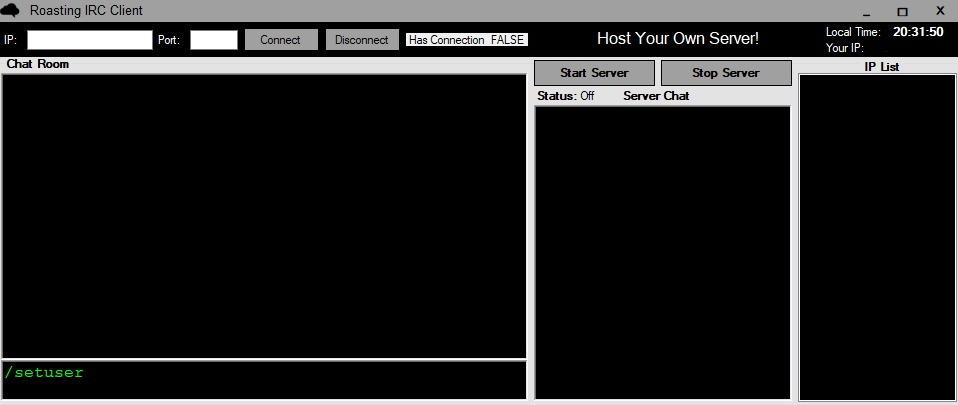A nice little IRC. There may be some bugs, that I cannot find. I am also trying to add a file share option to the program and a password wall to enter an IRC chat that requires one. These two addons will take me a while, and I might not even get to it. The current version of this IRC chat does NOT allow a custom port input! I have decided to retract that version and upload it to the Microsoft Windows store (Free Of Charge) in hopes of a future update where I can implement ads to generate a nice revenue off of it. This project was my very first project and I have a lot of pride in creating it and making it a great useful product for the consumer (you). This might be the last open source version of this IRC Chat unless I generate a generous amount of revenue from donations and shop revenue. as stated before I hope to add a password function as well as a list function that will allow server owners to publicize their IRC chat servers and allow users to select said servers. These features will enable a great social platform for those who are Anon to those who want to be known! As always, enjoy!
What is IRC?
Internet Relay Chat (IRC) is a text-based chat system. It enables discussions among any number of participants in so-called conversation channels, as well as discussions between only two partners — for example, in question-and-answer dialogues. Any participant may open a new conversation channel, and a single computer user can also take part in several such simultaneous channels.
In order to establish or join a chat, a network program, called an IRC client, is required for accessing a channel by connecting to a server. The IRC client can be either an independent program on the local computer (e.g. mIRC, XChat) or take the form of a special user interface from within a larger program such as an Internet browser; the Opera browser, for example, includes an IRC client, and clients such as Mibbit and IRCCloud or the open source KiwiIRC and MIT's The Lounge Chat can work in connection with many popular browsers.
An IRC network of interconnected servers operating as relay stations is used to mediate the calls in the IRC. The essential feature of this network is its BITNET communication topology, which permits only one communication path between any two participants. Historically, this ensured efficient communication, because in the early days of IRC, intercontinental data lines had a very limited capacity. The topology enabled a message from a client on one continent not to be sent individually for each client on another continent, but only once to a local server, which then distributed it to clients. Despite limited management capacities, very large “chat landscapes” were possible. The disadvantage is the lack of redundancy, which manifests itself in so-called net splits: if any server fails, the network automatically breaks into separate parts until a new connection is established between the parts.
The largest IRC networks consist of several dozen IRC servers that simultaneously connect over 100,000 users and manage tens of thousands of channels, on each of which several thousand people can simultaneously participate. Despite these enormous proportions, the delay in a sent text is usually on the order of tenths of a second and seldom exceeds one second's time.
IRC usage has been declining steadily since 2003, losing 60 percent of its users (from 1 million to about 400,000 in 2021) and half of its channels (from half a million in 2003 to under 200,000 in 2021). In April 2011, the top 100 IRC networks served more than half a million users at a time, hosting hundreds of thousands of channels operating on a total of roughly 1 500 servers out of roughly then 3 200 IRC servers worldwide. As of June 2021, there are 481 different IRC networks known to be operating, of which the open source Libera Chat, founded in May 2021, has the most users, with 21,348 channels on 15,433 servers; between them, the top 100 IRC networks share 188,336 channels operating on 96,708 servers.
